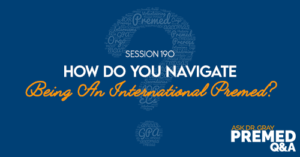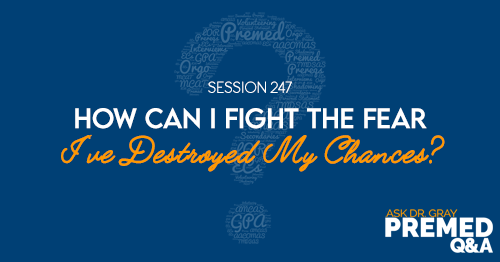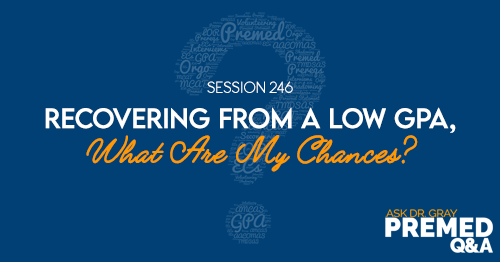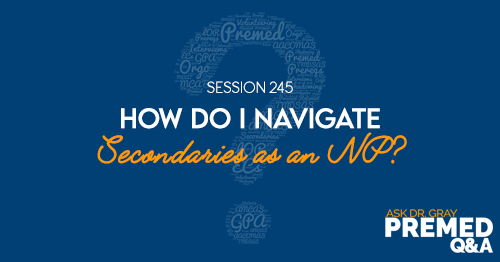Apple Podcasts | Google Podcasts
Session 190
This international premed student has questions about navigating her journey to medical school as an international student.
Ask Dr. Gray: Premed Q&A is brought to you by Blueprint MCAT. Listen to this podcast episode with the player above, or keep reading for the highlights and takeaway points.
The episodes in this podcast are recordings of our Facebook Live that we do at 3 pm Eastern on most weekdays. Check out our Facebook page and like the page to be notified. Also, listen to our other podcasts on MedEd Media. If you have any questions, call me at 617-410-6747.
[00:33] Question of the Day
“I’ve taken the MCAT twice now. And both times the score was decent, but it was not good. Then my GPA is not a 4.0, it’s alright as well. And I’m hitting a flunk on applications.
In my personal statement, I feel like maybe I’m too deep or maybe I’m not deep enough. It’s already July, I haven’t submitted anything. And I feel like I’m hitting that overwhelmed time period. I don’t know how to go about this. Should I just submit it? I just don’t know what the best option is.”
[01:21] The Imposter Syndrome
In this world of imposter syndrome, nothing is good enough and everything is terrible. And so, you have basically frozen in place. You haven’t submitted an application. You took the MCAT twice, and you still don’t like it.
'All of you premeds think you have to be perfect to get into med school... you don't have to be perfect!'Click To TweetAnd so, shooting for that perfection is just going to land you where you are now where, unfortunately, you’re hurting yourself by continuing to doubt yourself.
This student has a ton of worries. She’s worried about her letters of recommendation, her personal statement, and whether she should take the MCAT for the third time. So let’s help her make a decision and focus on one thing at a time.
[03:53] Let’s Start with Her Personal Statement
Our student is wondering whether she should mention certain struggles. She’s worried that if something’s too dark, they’ll use it against her as a weakness.
Life is inherently full of unknowns. And what she’s doing right now is trying to know the outcome before she even starts.
Whether her personal statement is good enough, well, nobody knows. The goal of the personal statement is to tell the story of why you want to be a doctor. And so, if you’re happy with your personal statement then great. That being said, we can’t win every game we play.
“If in your heart you have told your story and you think that when someone reads it, they'll understand why you want to be a doctor, then you have done your job.”Click To Tweet[05:08] Should She Take the MCAT The Third Time Around?
Her first MCAT was bad because she admits she did not study long enough. She got a 490 the first time, and the second time she took it, she got a 507. And she keeps on saying how she got a bad score.
Now, a 507 is not a bad score. This is the kind of premed perfectionist mentality that we just need to crush. A 507 is a good score. It’s not fantastic. But it’s average for applicants.
The average for everyone taking the MCAT is about 501.5. For students who apply to medical school, the average is about 507. The average for all students matriculating is about 511. And so, it’s not a bad score. It’s a good score, but not fantastic.
The MSAR says that of all of these schools, the median MCAT is a 517 or 518. And so anything less than that is terrible. And that’s not how we interpret data. This student argues she just wants to stand out. And a 507 might close some doors for her, but it will open some doors too.
'The goal is for YOU to be as good as you can, not to be the best person out of all 60,000 people applying.'Click To TweetThere is that one person out there with a 4.0 and 528 and I’ve had them on Application Renovation, but they didn’t get into med school. It’s not really just stats. It’s everything. Your stats have to be good enough. And for some schools out there, a 507 is good enough.
[09:39] Look at This Objectively
There are things subjectively and objectively that you can look at. Subjectively, we don’t know if your personal statement is good enough. That’s one of those things where you just have to make a leap. Objectively, your MCAT score is four points below the average score for matriculants. Then we can use that objective data to decide on whether you should retake the MCAT.
The question is: does a 512 guarantee acceptance versus a 507? And the answer is no. We don’t know what number actually guarantees acceptance.
“There is no number that guarantees acceptance. This is part of the game of doing the best that you can do.”Click To TweetYou went from a 490 to a 507. Now that 507, when anchored against that 490, schools will actually notice that. Most people will assume you took the first test without any preparation because some students do that. But really, they’re 507-515 students.
At the end of the day, you have to make the decision for yourself. See if you should wait another cycle to retake the MCAT when there’s no guarantee of you scoring any higher. There’s no guarantee that a higher score is going to get you in versus a 507. But a higher score always helps.
[11:31] Final Thoughts
The worst that can happen to you if you don’t get in, is you don’t get in. Then you can still fix your application and apply the next cycle and the next until you get in.
'You won't know if you don't get in until you apply.'Click To TweetThere’s a quote that says, “Great art is never finished. It just stops in interesting places.” You could nitpick your application till the cows come home. You could look at your personal statement a thousand times and nitpick it all day long. And you probably have, but at some point, you just have to stop because the “Mona Lisa” is done.
Lastly, regarding the letters of recommendation, she only has about three and can’t seem to get any more. She explains that she graduated the last two years of undergrad where during COVID, she did not make any friendships with professors.
She has two letters from science professors and one letter from her work supervisor. Now, you may need to reach out to schools that have requirements for a nonscience professor, and just explain your circumstance and see if they’re okay with that. The last thing you want to do is waste your money applying to schools that are going to hold you to specific letters.
Links:
Medical School HQ Facebook page
Medical School HQ YouTube channel
Instagram @MedicalSchoolHQ
Join the Application Academy!
The Premed Playbook: Guide to the Medical School Personal Statement
The Premed Playbook: Guide to the Medical School Application Process
SEARCH SITE
LISTEN FOR FREE












